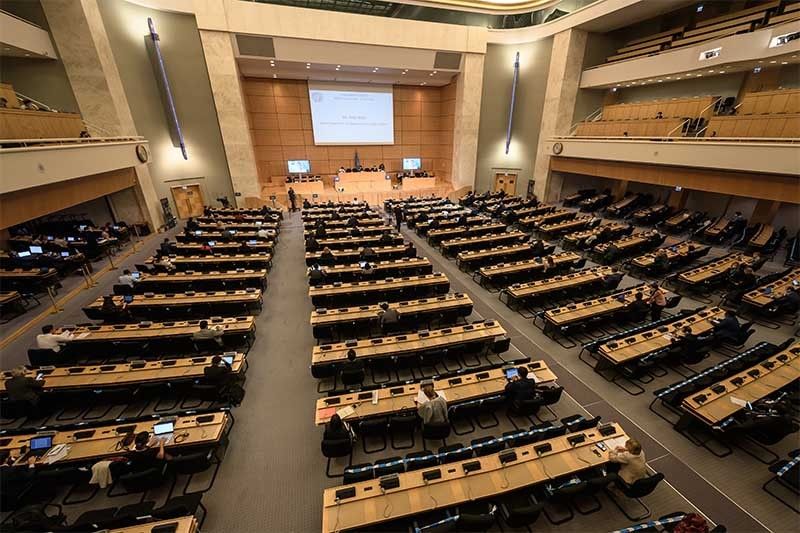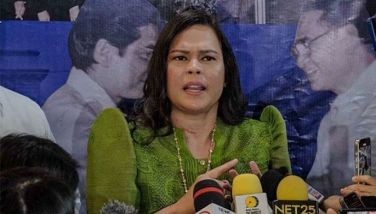UN rights council adopts resolution for technical assistance to Philippines on rights situation

MANILA, Philippines (Updated 8:00 p.m.) — The United Nations Human Rights Council adopted Wednesday a resolution on technical assistance and capacity building to improve the human rights situation in the Philippines.
The 47-member council adopted by consensus—which means no formal vote was taken—the resolution during the 45th session of the UNHRC in Geneva, Switzerland.
The text stopped short of launching an independent, on-the-ground investigation, which many human rights groups have been calling for.
In June, UN High Commissioner for Human Rights Michelle Bachelet released a report, which stated that government’s war on drugs and incitement to violence from the country’s top leaders have led to grave human rights violations, including “widespread and systematic” extrajudicial killings.
She urged the council to consider options for international accountability measures should there be an absence of clear outcomes from domestic mechanisms.
Technical cooperation
But the resolution tabled by Hungary, Iceland, India, Nepal, Norway, the Philippines, Thailand and Turkey focused on technical cooperation and capacity building.
It requested the Office of the High Commissioner to provide support for the Philippines in its fulfilment of its international human rights obligations and commitments.
These include the “proposed United Nations joint programme on human rights to provide technical assistance and capacity-building for, inter alia, domestic investigative and accountability measures, data gathering on alleged police violations, engagement with civil society, national mechanism for reporting and follow-up, counterterrorism legislation, and human rights-based approaches to drug control.”
The resolution asked the High Commissioner to present an oral update to the council at its 48th session and to submit a report at its 51st session on the assessment and evaluation of the technical assistance and capacity-building program.
The resolution also urged member states, UN agencies and other stakeholders to encourage and support technical cooperation between the Philippine government and the Office of the High Commissioner.
It also encouraged the Philippine government to address the issues raised in Bachelet's report.
Domestic accountability
The UN rights council said it recognizes the joint initiative of the Department of Justice and the Commission of Human Rights on a data-sharing agreement and the government’s announcement of a creation of a review panel that would re-evaluate cases of killings during anti-drug operations.
Human rights groups said that the creation of the inter-agency panel was designed to shield the Duterte administration from scrutiny.
As of July 31, the government’s official tally only counts 5,810 alleged drug personalities killed in its brutal anti-drug campaign since Duterte assumed office. But groups have higher estimates—more than 27,000 slain drug suspects—since mid-2016.
Duterte claimed Monday night that he once conducted a “discreet hearing” on extrajudicial killings linked to his brutal anti-drug campaign. He said that feuding drug gangs are responsible for the killings.
But watchdog Human Rights Watch cast doubt on whether the hearing took place at all, saying that its “far-fetched conclusion was never disclosed to the public.” It called the claim “specious, self-serving and utterly without basis.”
Asked on CNN Philippines' "The Source" on Wednesday about the supposed hearing, presidential spokesperson Harry Roque said "well, you know, the [Department of Justice] has formed an inter-agency committee to look into the killings so this could be what the president referred to.
"He added that the Philippine National Police also has "established procedures themselves to make sure the use of force was necessary."
‘Resolution falls short’
The Ecumenical Voice for Human Rights and Peace in the Philippines said it acknowledges the adoption of the resolution but stressed that it fell short in providing “more meaningful actions to address and impact on the worsening human rights situation in the Philippines.”
“We believe that programs for technical cooperation and capacity building would NOT decisively curb the worsening human rights situation in the country,” EcuVoice said.
“Victims and their families, human rights activists and defenders, and communities affected by these violations believe that prosecution and punishment of perpetrators of human rights violations, especially those committed by the highest officials in government, and thoroughgoing and immediate review, amendment, changes and/or repeal of policies instituted in law and practice by the Philippine government are among the crucial indicators in addressing the strong and persistent demands for justice and accountability,” it added.
The organization, however, stressed that the text is an indication of the international community’s acknowledgement of and scrutiny of the human rights situation under Duterte despite its shortcomings.
“It is likewise proof that the Duterte administration, despite its posturing and rhetoric, caved in to domestic and international pressure for justice and accountability,” EcuVoice said.
It also renewed its call for a thorough and comprehensive investigation, not in the hands of the government.
‘Duterte not off the hook’
Amnesty International said the “weak resolution” failed to advance justice for families of victims and let down human rights defenders, journalists and others who have engaged with the UN and pursue their work at huge personal risk.
“The states that negotiated with the Philippines to agree to this resolution have a responsibility to launch a full international investigation if there is no radical improvement in the human rights situation in the country,” said Rachel Chhoa-Howard, Philippines researcher at Amnesty International.
“These states face a credibility test: how will they respond if the bloody wave of killings continue, and the brutal crackdown on civil society and the media rages on?” she added.
Laila Matar, HRW deputy UN director, said human rights organizations are disappointed with the “collective failure” of UNHRC member states to establish international probe into killings and other human rights violations despite repeated calls by UN experts and civil society.
But it stressed that the adopted resolution means the Duterte administration cannot escape international scrutiny.
“It is quite clear that Duterte and the state forces behind the brutal campaign are not off the hook and will face continued examination,” Matar said, as she called on council members to follow up and ensure a probe is launched in the event that killings and abuses does not end.
Local rights group Karapatan challenged the government to allow the access of UN human rights mechanisms in the Philippines to assess if the country’s domestic accountability mechanisms are truly working and if they “have nothing to hide.”
“If no access will be given to independent human rights mechanisms to get a sense of the rapidly deteriorating human rights situation on the ground, it would only go to show that the Duterte administration is indeed merely posturing to evade accountability,” Cristina Palabay, Karapatan secretary general, said.
- Latest
- Trending





























